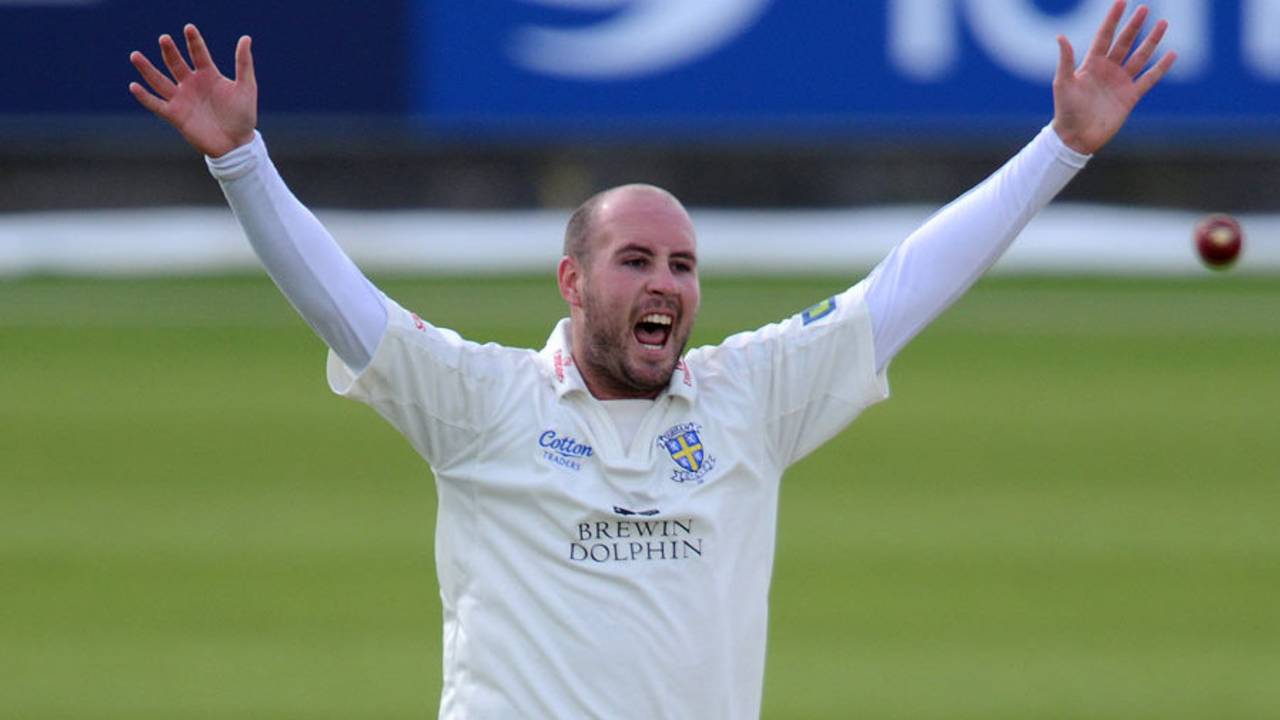English trio in Australia immigration nightmare
Chris Rushworth, county cricket's player of the year in 2015, is among at least four English county professionals refused entry to Australia because of visa problems
David Hopps
Nov 4, 2016, 12:22 PM
Chris Rushworth is one of at least four players refused entry to Australia • Getty Images
At least three English county professionals planning to spend the off-season playing cricket in Australia have been refused entry to the country because of visa issues and deported by the immigration authorities.
Ben Twohig, a Worcestershire left-arm spinner who has been a professional for only four months, has been the latest victim of an Australian visa clampdown. He follows two county professionals named by The Times - Ben Cox, also of Worcestershire and Durham seamer Chris Rushworth - in being refused entry in separate incidents.
Gloucestershire have confirmed, however, that their batsman Ian Cockbain has not been refused entry, contrary to reports, and he is playing under the appropriate visa in Melbourne.
With scores of England-based cricketers arriving in Australia - both from county and club cricket - the situation could yet worsen. Worcestershire alone have more than half-a-dozen players holding such deals.
The difficulties have caused the Professional Cricketers' Association (PCA) to contact its counterpart in Australia to discover whether there have been any changes in visa practice of which it is not aware.
David Leatherdale, the chief executive of the PCA, reiterated: "Our advice is to make sure they have the right visa, as you would expect, and follow the advice of the Australian Borders Agency."
Brighton CC , in Adelaide, have said they may appeal against the refused admission for Rushworth, county cricket's player of the year in 2015, who was not only sent home less than 24 hours after arriving at Tullamarine Airport but who was also banned from entering Australia for three years. David Alleyne, a former professional at Middlesex and Nottinghamshire, has taken over an emergency captaincy and coaching role at 40.
Cox, Worcestershire's wicketkeeper, who made last-minute plans to return to Australia, also suffered a three-year ban.
County professionals are advised by Australia's immigration department to apply for the Temporary Work (Long Stay Activity visa) which allows multiple entry for a period of two years, sometimes extended to a maximum of four years. A Sports Visa has now been withdrawn and is closed to new applicants.
Such a visa can be a long and arduous process which does not fit neatly with deals often struck at the last minute. It also needs a business sponsorship, which is easily obtained by a gun player of obvious repute heading for the Big Bash (where visa regulations, in any case, can be more accommodating), but less so by a young professional trying to make his name at a low-resourced, amateur club where financial assistance is often unreliable. And it potentially sets a limit on the number of times a young cricketer can visit the country.
Over the years, it has become common practice for many players to enter Australia on simple tourist visas, and for what cricket they play to be accepted as part of a holiday, but attitudes to a long-standing practice are becoming more unforgiving as a general climate of stronger border checks takes hold.
Immigration officers are alerted by "tourists" carrying substantial amounts of cricket equipment into the country which has also led to cannier cricketers sorting their gear on arrival in Australia.
Australia's more stringent checks are also apparent in other countries, the UK a prime example. Lengthy visa delays have caused chaos in amateur and professional sport over recent years. The situation is exacerbated by the immigration authorities seeming inability to understand the world of amateur or semi-professional cricket. Asian cricketers face a further inbuilt suspicion that they may not return home after the expiry of their visa.
Back in 2012, Mitchell Starc, the Australia left-arm quick, heading for a spell at Yorkshire, was deported following a visa error that initially led to him being detained at Heathrow for more than four hours. He flew back to Australia to fill in a couple of forms correctly and then flew all the way back again. Yorkshire's chairman at the time, Colin Graves, blamed his agent.
The long-established cultural exchange between cricketers, amateur and professional, has never looked rockier as countries enter an era of stiffer border controls. Cricket's governing bodies need to lobby their respective governments to find solutions.
David Hopps is a general editor at ESPNcricinfo @davidkhopps
